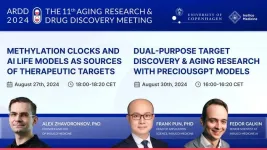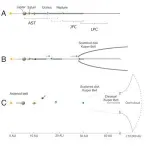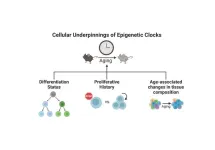(Press-News.org)
When exactly does the aging process start? With the aging mechanisms unclear, no consensus has been reached about aging “cliffs”, where our body functions and biological processes just change dramatically, as if overnight.
In 2019, a study published in the authoritative peer-reviewed journal Nature Medicine, based on plasma proteomics data, identified 34, 60, and 78 years old as key time points of aging. In August 2024, Nature Aging, a Nature portfolio journal focusing on aging mechanisms, published the latest findings incorporating comprehensive data including transcriptomics and metabolomics, pinpointing the aging cliffs to the 40s and 60s.
In the biomedical field, multi-omics data tracking RNA transcription, DNA methylation, protein composition, and change patterns of biological indicators are key to decoding disease mechanisms and developing targeted drugs. These technologies have also been applied to aging research, leading to breakthroughs including the multi-omics Chinese female aging clock by Chinese Academy of Science, and Precious2GPT, the combination of transformer and conditional diffusion for generation of multi-omics multi-species multi-tissue synthetic biological data, presented by Insilico Medicine. With the global population aged 65 and above exceeding 820 million, the demand for aging intervention research has become particularly urgent.
Started in 2014 by Alex Zhavoronkov, Ph.D., founder and CEO of Insilico Medicine, the Aging Research and Drug Discovery meeting (ARDD) has witnessed its ten-year anniversary and is currently the largest annual academic conference in the field of aging research. ARDD 2024 is co-chaired by Dr. Alex Zhavoronkov, Professor Morten Scheibye-Knudsen from the University of Copenhagen, and Dr. Daniela Bakula from the University of Copenhagen. In collaboration with the XPRIZE Foundation, the conference combines a five-day main presentation session with special events focusing on longevity drugs, aging biological mechanisms, and emerging technologies, encouraging the communication of cutting-edge anti-aging discoveries and promoting interdisciplinary thinking among academia and industry.
Over 170 experts attending ARDD come from important academic journals including Nature Biotechnology, Aging Cell, and npj Aging; leading companies and their affiliated funds including Novo Nordisk Foundation, Novartis, and L'Oréal; top research institutions such as Buck Institute for Research on Aging, McKinsey Health Institute, US National Institute on Aging, and Mayo Clinic; as well as world-renowned universities including Harvard University, Stanford University, University of Copenhagen, and National University of Singapore.
As a pioneer in applying generative AI to drug development, Insilico Medicine presents its leadership team and AI platform business development team at ARDD 2024, and industry partners are welcomed for communication and connection. On August 27th, Alex Zhavoronkov, Ph.D., founder and CEO of Insilico Medicine, will deliver a keynote speech on "Methylation Clocks and AI Life Models as Sources of Therapeutic Targets" from 18:00-18:20 local time; Frank Pun, Ph.D., head of application science of Insilico Medicine, and Fedor Galkin, senior scientist at Insilico Medicine, will share the latest progress in their presentation "Dual-Purpose Target Discovery & Aging Research with PreciousGPT Models".
Aging is a common challenge faced by the humankind, and an inevitable, enduring decline after the body's functions reach their peak, but fighting aging is not impossible. From Gilgamesh's travels for immortality to AI-powered aging research, efforts to push technological boundaries might have lived through the years, pointing to a way to healthier longevity – a future we are never closer to achieve.
About Insilico Medicine
Insilico Medicine, a global clinical stage biotechnology company powered by generative AI, is connecting biology, chemistry and clinical trials analysis using next-generation AI systems. The company has developed AI platforms that utilize deep generative models, reinforcement learning, transformers and other modern machine learning techniques for novel target discovery and the generation of novel molecular structures with desired properties. Insilico Medicine is developing breakthrough solutions to discover and develop innovative drugs for cancer, fibrosis, immunity, central nervous system diseases, infectious diseases, autoimmune diseases, and aging-related diseases.
www.insilico.com
END
Non-living hydrogels can play the video game Pong and improve their gameplay with more experience, researchers report August 23 in the Cell Press journal Cell Reports Physical Science. The researchers hooked hydrogels up to a virtual game environment and then applied a feedback loop between the hydrogel’s paddle—encoded by the distribution of charged particles within the hydrogel—and the ball’s position—encoded by electrical stimulation. With practice, the hydrogel’s accuracy improved by up to 10%, resulting in longer rallies. The researchers say that this demonstrates ...
The anti-cancer drug olaparib may be effective in treating biochemically recurrent prostate cancer without accompanying hormone therapy for men who have mutations in genes such as BRCA2, according to results of a phase II clinical trial of 51 patients conducted at the Johns Hopkins Kimmel Cancer Center and three other sites.
The study was done of men experiencing signs of cancer recurrence after surgical removal of the prostate, as measured by a high level of the protein prostate-specific antigen (PSA). Following treatment with olaparib, 13 participants, including all 11 who had BRCA2 mutations, had a decrease in PSA of at least 50% ...
Tens of millions of Americans are being exposed to tobacco content on streaming services, according to new research from The University of Texas MD Anderson Cancer Center. The researchers found that the odds of encountering tobacco products being advertised, marketed or promoted on these platforms increased based on race, ethnicity, socioeconomic status and smoking habits.
The nationally representative study, published today in JAMA Network, revealed an estimated 12.4% of American adults were exposed to tobacco promotion on streaming services. Exposure was highest among those with a high school education or less (16.4%), Black/African American respondents (19.4%), ...
About The Study: In two pivotal phase 3 clinical trials, elinzanetant, a selective neurokinin-1,3 receptor antagonist, demonstrated statistically significant reductions in vasomotor symptoms (VMS) frequency and severity vs placebo in postmenopausal individuals with moderate to severe VMS. Elinzanetant also significantly improved sleep disturbances and menopause-related quality of life vs placebo; the safety profile was favorable.
Corresponding Author: To contact the corresponding author, JoAnn V. Pinkerton, ...
About The Study: In this repeated cross-sectional study of children’s exposure to food-related television advertisements, exposure via children’s programming decreased substantially. However, most advertisements seen were still for unhealthy products, and exposure from all programming remained substantial. Findings of more than 90% of advertising exposure not from children’s programming and more than 1,000 food-related advertisements seen per year suggest the need for government regulations based on time of day rather than programming.
Corresponding Author: To contact the corresponding author, Lisa M. Powell, PhD, email powelll@uic.edu.
To ...
About The Study: In this study of the prevalence of exposure to tobacco advertisements on TV or streaming platforms among U.S. adults, disparities in exposure by race or ethnicity, education level, and smoking status were identified. These findings underscore the need for targeted public health interventions and regulation to address these disparities and reduce the impact of tobacco advertisements on vulnerable populations.
Corresponding Author: To contact the corresponding author, Sanjay Shete, PhD, email sshete@mdanderson.org.
To access the embargoed study: Visit our For The Media website at this link https://media.jamanetwork.com/
(doi:10.1001/jamanetworkopen.2024.27781)
Editor’s ...
Thyroid hormone plays a key role in regulating a range of physiologic functions, including metabolism, temperature, heart rate, and growth. It accomplishes this impressive array of activities by interacting with almost every organ system in the body. Yet despite a long history of research on how thyroid hormone influences different organs, its effects on arguably the most crucial organ — the brain — have remained shrouded in mystery.
Now, scientists at Harvard Medical School have gained ...
Higher thiazide doses are associated with greater reductions in urine calcium, which in turn correlate with fewer symptomatic kidney stone events, according to a Vanderbilt University Medical Center (VUMC) study published in JAMA Network Open.
Thiazide diuretics, commonly prescribed to prevent kidney stone recurrence, are drugs that act directly on the kidneys to promote diuresis (urine flow) by inhibiting the sodium/chloride cotransporter located in the distal convoluted tubule of a nephron ...
How old are you, really? Your chronological age is the number of years you have been alive. Your biological age is how old your cells are which scientists believe may better assess one’s age-related health and disease risk. People biologically age at different rates, depending on genetic and environmental factors, so that a person’s chronological age does not necessarily match their biological age. In recent years, direct-to-consumer biological age tests have become increasingly accessible and popular as interest has increased ...
In a study published today (22 August) in Cell Reports Physical Science, a team led by Dr Yoshikatsu Hayashi demonstrated that a simple hydrogel - a type of soft, flexible material - can learn to play the simple 1970s computer game ‘Pong’. The hydrogel, interfaced with a computer simulation of the classic game via a custom-built multi-electrode array, showed improved performance over time.
Dr Hayashi, a biomedical engineer at the University of Reading’s School of Biological Sciences, said: "Our research shows that even very simple materials can exhibit complex, adaptive behaviours typically associated with living systems or sophisticated AI.
"This ...






